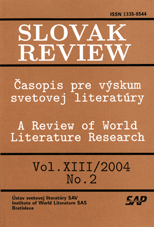RECEPCIA TVORBY IMRE KERTÉSZA DOMA A V ZAHRANIČí
Home and Foreign Reception of the Imre Kertesz's Work
Author(s): Judit GörözdiSubject(s): Literary Texts
Published by: Ústav svetovej literatúry, Slovenská akadémia vied
Keywords: Home and Foreign Reception; Reception Applying the Principles of Mimesis and Ideology; Contextualization and Reception; Re-modeling of the Home Literary Canon by Foreign Reception; Atonality of Language and Text Universe.
Summary/Abstract: The author divided the factors that have formed different home and foreign (chiefly German) reception of the work by a Hungarian writer and a Nobel Prize laureate Imre Kertész, into three circles. Since the author's prose work and his essays attend to holocaust, the factor of the social context are related with the social processing of this problem, which in Hungary was conditioned by the fact that the topic was a taboo in the era of the socialist state and by extreme utterances after the dissolving of ideological obstructions from the end of the 1980s. The German reception of Kertész's work was helped by a lively social discussion on the problem, which perceived holocaust along with historical also in sociological and socially ethical consequences. Literary and historiographical factors of inappropriate home reception show particular asymmetry, which concerns a relatively high number of literary critical echoes on particular works by the author and the lack, respectively the retardation of literary historical treatment of his work. Deeper reception of analytical character in Hungarian literary studies started to proceed after some time in consequence of a detachment of the studies from mimetic-aesthetic and ideologically conditioned horizons of expectations. At present literary and artistic factors of Kertész's work inspire various approaches of studying, which take into consideration the context of Jewish literature, discourse on holocaust, social and psychological aspects, study the language of the interpretation and the destructivity of narration as an alternative to historical narratives on the problem.
Journal: Slovak Review of World Literature Research
- Issue Year: 2004
- Issue No: 02
- Page Range: 144-153
- Page Count: 10
- Language: Slovak

